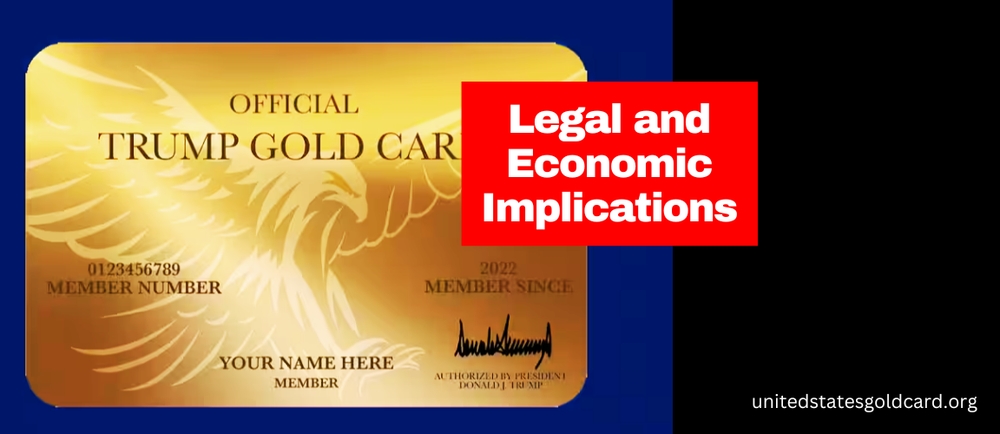Published
- 4 min read
The Legal and Economic Implications of the Gold Card Visa

The Legal and Economic Implications of the Gold Card Visa
Will Trump’s Bold Proposal Stand Up to Legal Scrutiny and Deliver on Its Economic Promises?
Trump’s Gold Card visa is shaking up the world of investor immigration—but beyond the flashy headlines lie deep legal and economic questions. In this post, we explore whether the Gold Card visa can deliver on its promises, the potential legal hurdles it might face, and the broader economic impact of a system that aims to “sell” a path to citizenship.
Legal Challenges: Who Holds the Power?
Congress vs. Executive Action The current EB‑5 program wasn’t created on a whim—it was established by Congress in 1990 to spur economic growth through foreign investment. Changing its fundamental structure or replacing it entirely with a program like the Gold Card visa is no small feat. Critics argue that immigration law is firmly within the realm of Congress, and any sweeping executive action could be challenged on constitutional grounds.
- Constitutional Authority: Immigration is an enumerated power of Congress under Article I, Section 8. Any unilateral change could spark legal battles over executive overreach.
- Past Precedents: Previous attempts to modify immigration policies via executive orders have faced significant legal scrutiny. Legal experts, including noted immigration scholars, warn that without explicit Congressional backing, Trump’s new initiative could crumble in court.
Expert Voices Legal analysts such as Michael Wildes from the Cardozo School of Law have expressed skepticism, noting that replacing an established program like EB‑5 without Congressional approval is a risky move. The CATO Institute’s commentary similarly suggests that while selling legal residence might seem innovative, the legal groundwork isn’t solid enough to support such a dramatic departure from established norms.
Economic Impact: Bold Promises vs. Ground Realities
Revenue Generation: Grand Projections On paper, Trump’s vision is tantalizing: if a million Gold Cards were sold, the U.S. could potentially generate trillions of dollars—enough to make a dent in the national debt. However, this projection faces several practical challenges:
- Market Size: While the promise of a fast track to citizenship is appealing, the pool of ultra-high-net-worth individuals who could actually afford a $5 million fee is far smaller than a million. Realistic estimates suggest that only a fraction of wealthy investors would participate.
- Economic Spillovers: Unlike the EB‑5 program, which requires investments to create or preserve jobs, the Gold Card visa appears to bypass this criterion. Proponents argue that wealthy individuals will stimulate the economy indirectly through increased spending and business development. Yet, critics worry that without direct job creation mandates, the economic benefits could be less tangible.
Efficiency and Fraud Prevention One of the key selling points of the Gold Card visa is its promise of a simplified, cash-only process. Commerce Secretary Howard Lutnick dismissed the EB‑5 program as “full of nonsense and fraud,” arguing that a higher price tag would deter shady practices. However, while a straightforward cash payment might reduce some forms of fraud, it also raises concerns:
- Quality vs. Quantity: A high barrier to entry might ensure that only serious investors participate—but it could also mean that fewer people invest, potentially limiting the expected economic boost.
- Accountability: With the job creation requirement removed, there is less assurance that these investments will translate into meaningful economic growth or job creation in local communities.
Political and Social Considerations
Citizenship as a Commodity Perhaps the most controversial aspect of the Gold Card visa is its implicit suggestion that citizenship can be bought. This notion raises fundamental questions about the meaning of national identity and fairness in immigration policy.
- Public Perception: Critics argue that turning citizenship into a luxury product undermines the principles of merit and equality that many believe should underlie immigration systems.
- Social Impact: There is also concern that such a system could exacerbate social divides, favoring the ultra-wealthy at the expense of more traditional pathways to residency and citizenship.
Final Thoughts: A High-Stakes Gamble
Trump’s Gold Card visa is as bold as it is controversial. While its promise of streamlined processing and substantial revenue generation is attractive to many, the legal hurdles and economic uncertainties cast a long shadow over its future. The proposal challenges long-held norms about immigration, raising critical questions about constitutional authority, the true scope of economic benefits, and the very nature of citizenship in America.
As this initiative moves forward, it will be crucial to watch how courts respond to its executive basis and whether the market for such high-priced visas develops as optimistically projected. For now, the Gold Card visa remains a high-stakes gamble—one that could either transform U.S. investor immigration or become a cautionary tale of policy overreach.